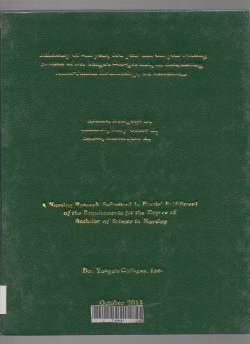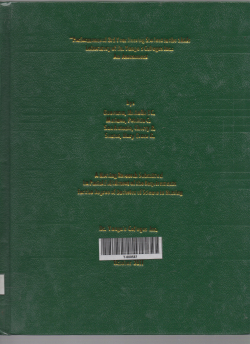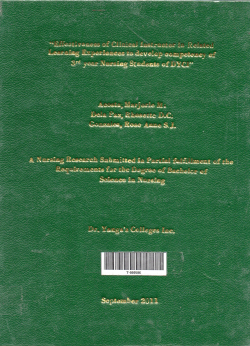Efficiency of 2nd year,3rd year and 4th year Nursing student of Dr. Yanga's colleges inc. in establishing nurse-patient relationship:An Assessment

Type
Thesis
Authors
Category
CHS
[ Browse Items ]
Subject
efficiency
Abstract
Abstract
This study dealt with the assessment of the efficiency of 2 year, year and 4th year nursing students of Dr. Yanga’s Colleges, Inc.- College of Nursing for the 1st semester of S.Y. 2011- 2012. This was an offshoot of the researchers’ utmost desire to uplift the quality of students’ efficiency in establishing nurse- patient relationship, know the areas where they do well and be aware of the areas which need further improvement.
It utilized the descriptive type of research design. It is a non- experimental design that involves studying a population based on the data gathered from sample drawn. This research utilized probability sampling method in which 150 nursing students from 21 year, 3rd year and 4th year levels of Dr. Yanga’s Colleges, Inc.- College of Nursing for the 1st semester of S.Y. 2011- 2012 were asked to answer a questionnaire regarding their profile and their assessment of their efficiency in establishing nurse- patient relationship.
Frequency distribution, percentage, weighted mean and ranking were the tools utilized to organize and interpret the data gathered.
Collected data are interpreted using Likert Scale with always inclusive of ranges 3.26- 4.00, oftentimes inclusive of ranges 2.51- 3.25, seldom inclusive of ranges 1.76- 2.50 and never inclusive of ranges 1.00- 1.75.
Results revealed satisfying level of perceived level of efficiency of second year, third year and fourth year nursing students in establishing nurse- patient relationship. The students were being adhered to be efficient in terms of building harmonious relationship with the patient regardless of their year level and biological gender.
The element which gariiered highest weighted mean is perception ( with the grand mean of 3.685) and the element which received the lowest average is transaction ( with the grand mean of 3.558).
Male respondents have shown highest perceived level of efficiency in terms of perception (with the grand mean of 3.66) and the element which received the lowest is the interaction ( with the grand mean of 3.530). Meanwhile, female respondents have also shown the highest perceived level of efficiency in terms of perception (with the grand mean of 3.686) and the element which received the lowest average, the same as male respondents, is
interaction (with the grand mean of 3.492). -
In terms of year level, second year nursing students view themselves as efficient most in judgment ( with the grand mean of 3.684) and lowest is action ( with the grand mean of
3.588).
On the other hand, third year nursing students had shown the highest efficiency in terms of perception ( with the grand mean of 3.744) and the lowest is interaction ( with the grand mean of 3.644)
Meanwhile, fourth year nursing students perceived themselves as most efficient in terms of perception (with the grand mean of 3.704) and the lowest is transaction (with the grand mean of 3.444).Students view themselves to be efficient in terms of their perception towards their profession as what Imogene King believed to be the primary element in nurse- patient relationship. A nurse’s perception is the foundation of building a firm and harmonious relationship with the patient.
It is believed that it is in the student nurse’s perception lies the efficiency of rendering effective and quality nursing care, as per Imogene King’s Theory of Goal Attainment stated.
Meanwhile, the component which garnered the lowest weighted mean is the transaction, in which, according to Imogene King’s Theory, is the last component to be achieved after accomplishing nurses’ perception, judgment, action, reaction and interaction.
Based on the researchers’ findings, it is being understood that the component which garnered the lowest weighted mean is the transaction since the respondents of the study are still student nurses, therefore, desired outcomes are not yet fully achieved, in the nursing student respondents’ case, they are deemed to be novice nurses. It is in transaction
This study dealt with the assessment of the efficiency of 2 year, year and 4th year nursing students of Dr. Yanga’s Colleges, Inc.- College of Nursing for the 1st semester of S.Y. 2011- 2012. This was an offshoot of the researchers’ utmost desire to uplift the quality of students’ efficiency in establishing nurse- patient relationship, know the areas where they do well and be aware of the areas which need further improvement.
It utilized the descriptive type of research design. It is a non- experimental design that involves studying a population based on the data gathered from sample drawn. This research utilized probability sampling method in which 150 nursing students from 21 year, 3rd year and 4th year levels of Dr. Yanga’s Colleges, Inc.- College of Nursing for the 1st semester of S.Y. 2011- 2012 were asked to answer a questionnaire regarding their profile and their assessment of their efficiency in establishing nurse- patient relationship.
Frequency distribution, percentage, weighted mean and ranking were the tools utilized to organize and interpret the data gathered.
Collected data are interpreted using Likert Scale with always inclusive of ranges 3.26- 4.00, oftentimes inclusive of ranges 2.51- 3.25, seldom inclusive of ranges 1.76- 2.50 and never inclusive of ranges 1.00- 1.75.
Results revealed satisfying level of perceived level of efficiency of second year, third year and fourth year nursing students in establishing nurse- patient relationship. The students were being adhered to be efficient in terms of building harmonious relationship with the patient regardless of their year level and biological gender.
The element which gariiered highest weighted mean is perception ( with the grand mean of 3.685) and the element which received the lowest average is transaction ( with the grand mean of 3.558).
Male respondents have shown highest perceived level of efficiency in terms of perception (with the grand mean of 3.66) and the element which received the lowest is the interaction ( with the grand mean of 3.530). Meanwhile, female respondents have also shown the highest perceived level of efficiency in terms of perception (with the grand mean of 3.686) and the element which received the lowest average, the same as male respondents, is
interaction (with the grand mean of 3.492). -
In terms of year level, second year nursing students view themselves as efficient most in judgment ( with the grand mean of 3.684) and lowest is action ( with the grand mean of
3.588).
On the other hand, third year nursing students had shown the highest efficiency in terms of perception ( with the grand mean of 3.744) and the lowest is interaction ( with the grand mean of 3.644)
Meanwhile, fourth year nursing students perceived themselves as most efficient in terms of perception (with the grand mean of 3.704) and the lowest is transaction (with the grand mean of 3.444).Students view themselves to be efficient in terms of their perception towards their profession as what Imogene King believed to be the primary element in nurse- patient relationship. A nurse’s perception is the foundation of building a firm and harmonious relationship with the patient.
It is believed that it is in the student nurse’s perception lies the efficiency of rendering effective and quality nursing care, as per Imogene King’s Theory of Goal Attainment stated.
Meanwhile, the component which garnered the lowest weighted mean is the transaction, in which, according to Imogene King’s Theory, is the last component to be achieved after accomplishing nurses’ perception, judgment, action, reaction and interaction.
Based on the researchers’ findings, it is being understood that the component which garnered the lowest weighted mean is the transaction since the respondents of the study are still student nurses, therefore, desired outcomes are not yet fully achieved, in the nursing student respondents’ case, they are deemed to be novice nurses. It is in transaction
Number of Copies
1
| Library | Accession No | Call No | Copy No | Edition | Location | Availability |
|---|---|---|---|---|---|---|
| Main | 567 | T R11 2011 | 1 | Yes |



